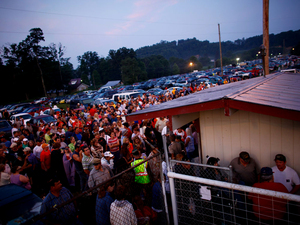
It was a Third World scene with an American setting. Hundreds of tired and desperate people crowded around an aid worker with a bullhorn, straining to hear the instructions and worried they might be left out.
Some had arrived at the Wise County Fairgrounds in Wise, Va., two days before. They slept in cars, tents and the beds of pickup trucks, hoping to be among the first in line when the gate opened Friday before dawn. They drove in from 16 states, anxious to relieve pain, diagnose aches and see and hear better.
"I came here because of health care — being able to get things that we can't afford to have ordinarily," explained 52-year-old Otis Reece of Gate City, Va., as he waited in a wheelchair beside his red F-150 pickup. "Being on a fixed income, this is a fantastic situation to have things done we ordinarily would put off."
 For the past 10 years, during late weekends in July, the fairgrounds in Wise have been transformed into a mobile and makeshift field hospital providing free care for those in need. Sanitized horse stalls become draped examination rooms. A poultry barn is fixed with optometry equipment. And a vast, open-air pavilion is crammed with dozens of portable dental chairs and lamps.
For the past 10 years, during late weekends in July, the fairgrounds in Wise have been transformed into a mobile and makeshift field hospital providing free care for those in need. Sanitized horse stalls become draped examination rooms. A poultry barn is fixed with optometry equipment. And a vast, open-air pavilion is crammed with dozens of portable dental chairs and lamps.A converted 18-wheeler with a mobile X-ray room makes chest X-rays possible. Technicians grind hundreds of lenses for new eyeglasses in two massive trailers. At a concession stand, dentures are molded and sculpted.
Desperate For Health Care
The 2009 Remote Area Medical (RAM) Expedition comes to the Virginia Appalachian mountains as Congress and President Obama wrestle with a health care overhaul. The event graphically illustrates gaps in the existing health care system.
 "We're willing to sleep in pickup trucks or cars and deal with the elements to at least get some kind of health care," Reece adds. He earned a six-figure income working for an international industrial supply firm until an accident five years ago left him disabled. Joining him for dental, vision and medical checks are his wife, daughter, son-in-law and three grandchildren.
"We're willing to sleep in pickup trucks or cars and deal with the elements to at least get some kind of health care," Reece adds. He earned a six-figure income working for an international industrial supply firm until an accident five years ago left him disabled. Joining him for dental, vision and medical checks are his wife, daughter, son-in-law and three grandchildren."Tomorrow, I'm going to see the doctor to get my ear and my nose fixed!" grandson Jacob shouts excitedly. His nose appears battered and his ear has an oozing scab.
Before the gate opened, Loretta Miller, 41, of Honaker, Va., got four hours' sleep behind the wheel of her parked minivan. She was No. 39 in line for her eighth RAM expedition. Her visit last year saved her life.
"They done an ultrasound and told me that my gallbladder was enlarged and was ready to burst and it could kill me," Miller recalls. "They told me if I hadn't got help when I did, literally I could have died."
Medical, dental and vision help is often elusive for the 2,700 people seeking treatment during the three-day RAM event. Just over half of the people attending this year have no insurance at all, according to a survey of the patients conducted by RAM. Forty-seven percent could be considered underinsured, given unaffordable copays or gaps in coverage provided by Medicare, Medicaid and conventional insurance plans. Only 11 patients have dental insurance, and just seven have vision coverage.
By The Numbers
A survey of RAM attendees by the event's organizers provides some insight into who is left out of conventional medical, dental and vision care.
What: Health care providers saw 2,715 patients and performed 2,671 medical exams, 1,088 eye tests and 1,850 dental exams. They extracted 3,857 teeth and put in 1,628 fillings.
Who: Patients came from 16 different states; 30 percent were repeat patients.
Of the patients, 51 percent are uninsured, 40.3 percent are on Medicaid or Medicare, and just 7.3 percent have employer or private insurance. Fewer than 1 percent of patients have dental or vision insurance.
Twenty-six percent of the people are employed, 40.6 are unemployed, 4.7 percent are retired and 4.8 percent are children.
Cost: The organizers paid about $250,000 out of pocket to run the event, and they provided an estimated $1.5 million worth of care.
"There's no doubt about it. There is a Third World right here in the United States," concludes Stan Brock, RAM's founder
http://www.npr.org/templates/story/story.php?storyId=111066576








No comments:
Post a Comment